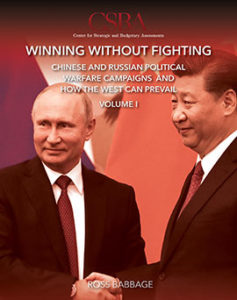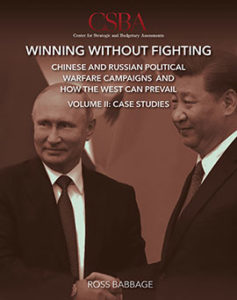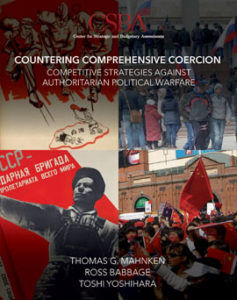 In the Russian view of information warfare, there is no front line and rear areas, and no non-combatants, Chatham House reports. According to Russia’s Chief of General Staff General Valeriy Gerasimov, a key feature of modern warfare in the information domain is ‘simultaneous effects to the entire depth of enemy territory’.
In the Russian view of information warfare, there is no front line and rear areas, and no non-combatants, Chatham House reports. According to Russia’s Chief of General Staff General Valeriy Gerasimov, a key feature of modern warfare in the information domain is ‘simultaneous effects to the entire depth of enemy territory’.
Malign actors are intent on using digital tools as weapons of political warfare, or fifth generation warfare, according to the Global Disinformation Index’s latest research. Beijing’s aggressive disinformation campaign against Hong Kong’s democracy movement, is only the latest, most conspicuous case.
Democratic allies need to band together in a coordinated effort to counter Chinese and Russian “political warfare operations” to ward off threats to freedom and national sovereignty, according to a respected analyst.
 “Countering the political warfare threat is really a challenge for all democracies and we need to build an international coalition to underpin the sovereignty and independence of all parties,” strategist Ross Babbage told a recent Williams Foundation seminar.
“Countering the political warfare threat is really a challenge for all democracies and we need to build an international coalition to underpin the sovereignty and independence of all parties,” strategist Ross Babbage told a recent Williams Foundation seminar.
“While there are many things that governments can do in this space, we really need to foster broader societal responses to the political warfare campaigns of the Chinese and Russians,” he said.
Political warfare – diverse operations to influence, persuade, and coerce nation states, organizations, and individuals without the use of kinetic force – is a deeply rooted and sophisticated element of Vladimir Putin’s and Xi Jinping’s regimes, Babbage and his colleagues Eric Edelman and Thomas G. Mahnken argue in Winning Without Fighting. The report, from the Center for Strategic and Budgetary Assessments (CSBA), draws on several case studies to make a series of recommendations for Western policymakers.
 The report draws on the experience of Cold War efforts to combat Soviet “active measures” and promote liberal democratic ideas and institutions. The authors commend USG-funded programs, like the National Endowment for Democracy, which because they were transparent and publicly acknowledged helped avoid accusations of U.S. interference in foreign political processes.
The report draws on the experience of Cold War efforts to combat Soviet “active measures” and promote liberal democratic ideas and institutions. The authors commend USG-funded programs, like the National Endowment for Democracy, which because they were transparent and publicly acknowledged helped avoid accusations of U.S. interference in foreign political processes.
The Center for Strategic and Budgetary Assessments (CSBA) report, Countering comprehensive coercion, makes clear that China has been conducting political warfare–type operations – what the NED calls “sharp power” – for over a decade.
 We’ve got to improve our information operations. We need to throw sunlight on what these guys are doing and do so in a comprehensive and sustained manner, argues Babbage, adding further components of an effective counter strategy:
We’ve got to improve our information operations. We need to throw sunlight on what these guys are doing and do so in a comprehensive and sustained manner, argues Babbage, adding further components of an effective counter strategy:
- First is a denial strategy. Here the objective is to deny, not just the operations and make them ineffective, but also to deny the political benefits that authoritarian states seek to win by conducting their operations.
- Second is a cost imposition strategy. We need to find ways to correlate their behavior with an imposed cost. We need to make clear that if they are going to behave like this, it will cost them in specific ways.
- Third is focused on defeating their strategy, or making their strategy counterproductive. We can turn their strategy on its head and make it counter-productive even within their own societies. Their own societies are fair game given the behavior of the of our combined assets Russians and Chinese.
- Fourth is to make it damaging, and even dangerous, for authoritarian regimes to sustain their political warfare strategy. Authoritarian regimes have their own vulnerabilities and we need to focus on the seams in their systems to make their political warfare strategies very costly and risky.
And we need to do this comprehensively as democratic allies, he contends.
His views echo those of a recent UK report, 21st Century Authoritarian Powers and the Reshaping of Warfare in the Contest for Global Leadership.
“In this very modern approach to warfare, everything is a potential weapon, from the media to energy supplies,” the authors contend. “Culture and language; money as investment; bribes; organized crime; deception and so-called psyops (psychological operations); subversion; dirty tricks; espionage: all are marshaled to the cause of undermining liberal democracy.”







